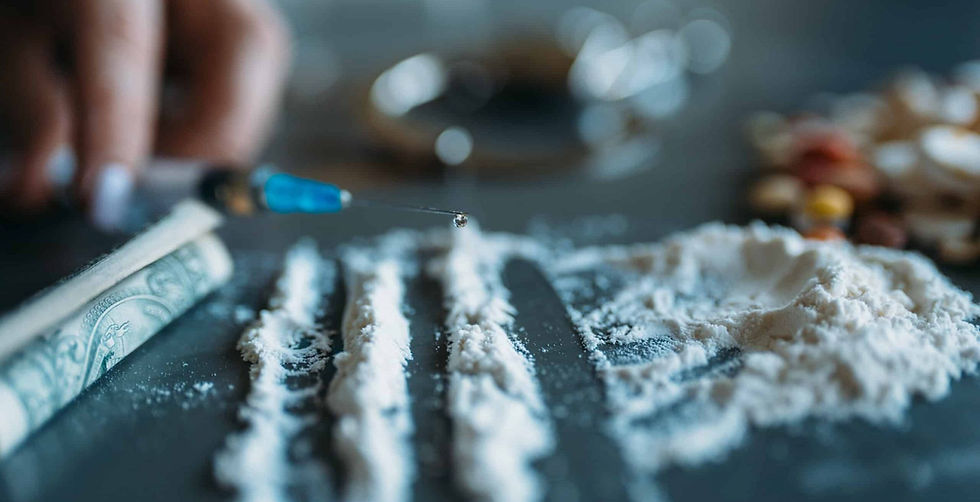Stimulant-Induced Psychosis: Cocaine, Meth, and Beyond
- Collective Care

- Sep 30, 2025
- 3 min read
A Collective Care Center Blog
Introduction
At Collective Care Center, we frequently treat individuals struggling with the devastating impact of stimulant drugs such as cocaine, amphetamines, and methamphetamine. One of the most severe complications linked to these substances is stimulant-induced psychosis — a state of paranoia, hallucinations, and disorganized thinking that can mimic schizophrenia.
As a psychiatric and therapeutic rehab centre, we use evidence-based science, compassionate care, and personalised rehab plans at Collective Care to help clients and families understand, manage, and recover from this condition.
What Is Stimulant-Induced Psychosis?
Stimulant-induced psychosis is a psychiatric syndrome where stimulant use triggers psychotic symptoms, including:
Hallucinations (often auditory or tactile, such as the “cocaine bugs” sensation)
Paranoid delusions (e.g., believing one is being followed or monitored)
Severe agitation or aggression
Disorganized thinking
While some symptoms subside once the drug leaves the body, repeated use or high doses can cause long-lasting or recurrent psychosis.
Scientific Research Insights
Cocaine and Psychosis
Studies show up to 86% of cocaine-dependent individuals experience psychotic symptoms during use or withdrawal.
Common symptoms include paranoia, auditory hallucinations, and tactile hallucinations.
Methamphetamine and Psychosis
Research highlights that 25–46% of methamphetamine users develop psychotic symptoms.
Long-term meth use is associated with neuroinflammation, dopamine dysregulation, and persistent vulnerability to psychosis, even after abstinence.
Beyond Cocaine and Meth: Other Stimulants
Prescription stimulants (like amphetamines for ADHD) rarely trigger psychosis when used as prescribed, but misuse or high-dose exposure increases risk.
Synthetic cathinones (“bath salts”) are linked to severe paranoia and aggression, often requiring emergency intervention.
These findings emphasize that stimulant-induced psychosis is not a rare side effect — it’s a serious, well-documented risk that requires professional intervention.
Why Does It Happen?
Stimulants act on the brain’s reward circuits, especially the dopamine system. By flooding the brain with dopamine, these drugs overstimulate pathways tied to motivation, perception, and threat detection. Over time, repeated surges can destabilize brain chemistry, increasing the risk of paranoia, hallucinations, and lasting psychiatric conditions.
Treatment at Collective Care Center
At Collective Care Center, we provide comprehensive care for stimulant-induced psychosis through:
Medical Stabilization: Psychiatric evaluation and safe detox protocols.
Rehabilitation with clinical psychologists to address cognitive, emotional, and behavioral impacts.
Certified counsellors for addiction recovery, offering structured therapy and relapse-prevention planning.
12-step recovery program India: Integrated with evidence-based therapy for clients who benefit from structured peer-support models.
Relapse prevention support group Pune: Ongoing community-based support for sustainable recovery.
Rehabilitation for professionals and working adults: Tailored care that balances treatment with work and personal responsibilities.
Personalised rehab plans at Collective Care: Every individual receives a care plan adapted to their unique medical, psychological, and social needs.
Voices of Hope: What Clients Say
Many individuals and families describe Collective Care Center as a place of trust, safety, and transformation. Our top-rated rehab centre testimonials highlight how integrated treatment, compassionate staff, and structured aftercare have helped clients rebuild their lives after stimulant-induced psychosis and addiction.
Final Words
Stimulant-induced psychosis is a stark reminder of how profoundly drugs like cocaine and methamphetamine can alter brain chemistry and mental health. Yet, with integrated psychiatric care, therapeutic rehabilitation, and holistic recovery models, long-term healing is possible.
At Collective Care Center, we combine science, compassion, and structure to ensure that every individual receives the care they deserve. Whether you’re searching for a psychiatric and therapeutic rehab centre, a 12-step recovery program in India, or a relapse prevention support group in Pune, we are here to guide you toward recovery.


